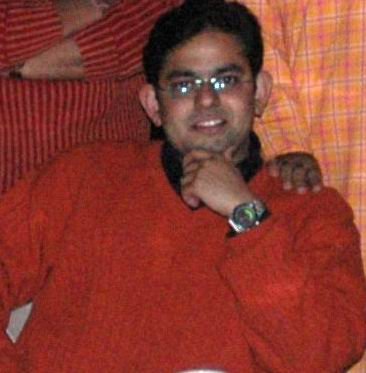This Friday evening while waiting for Raju to finish his work, I got into small talk with Indraneel who was the only other person in office still working. After the initial rattle, the conversation changed as follows:
Me: Indraneel, do you believe in God? (I like asking this question to people. This almost always results in an interesting conversation when I am not able to find something else to talk :))
Indraneel: No. I don't.
Me: So you're an atheist? A non-believer?
Indraneel: No.
Me: So what are you?
Indraneel: I'm agnostic.
Me: What does that mean? How is it different from being an atheist?
Indraneel: Well, an atheist is someone who does not believe in the existence of God. An agnostic is someone who does not know whether God exists.
Me: So, in this sense, he is someone sitting on the fence -- neither a believer or a non-believer.
Indraneel: True.
Me: And why are you confused?
Indraneel: Because Fred Hoyle once remarked "........" (I've forgotten what Indraneel exactly quoted but it meant that Hoyle was confused about the existence of God... and since he, being a great physicist that he was, was confused, so was Indraneel. And that justified his on-the-fence thinking. A fairly logical explanation indeed -
if you don't completely understand something believe someone who you know knows more about it.)
Me: Hmm... So what do you think of all the people who believe in God? What do you think of religion?
Indraneel: Well, people are free to choose what they believe. I have no issues with people following one faith or the other. I am a Hindu by birth but not by practice.
Me: So you don't participate in rituals like the Durga pooja?
Indraneel: I do. But, to me, that is more of a social gathering than a religious one.
Me: What purpose do you think religion serves? Does it help if people believe in God? (Another of my favorite questions :))
Indraneel: Religion does serve an important purpose. If you tell a layman not to do something because it is wrong, he isn't likely to follow you. But, if you tell the same person not to do something because if he did that, he will surely go to hell... as God had forbidden it. He won't.
(Hmm... why would anyone want to go to hell... that too after suffering life on earth! Nothing's worth paying for with a visit to hell... a bad bargain always!
I liked the way the conversation was going. This guy had really thought out the whys and wherefores of religion and God.)
Me: Great....! So you too believe that religions have been conceived by our enormously shrewd (or wise, in the positive sense) ancestors who came out with a set of rules for ordinary mortals to follow. Each rule was conveniently attributed to God (or one of his messengers). Compliance with them promised everlasting happiness for yourself and your loved ones. Non-compliance was a confirmed ticket to hell.
Indraneel: Yes. We have so many wars in the name of religion. So many people die. But, if there was no religion, there would be more conflicts.
Me: Sure. Religion does serve a purpose. It oppresses a large number of people for their own good. Think of what would happen if "thou shalt not steal" wasn't one of the commandments. There would be anarchy. Not that people don't steal anymore but the number of people stealing would be a lot more without this commandment for they would fear no God. So religion contains anarchy. Religion fights nature and natural desires of human beings. It differentiates humans from animals and puts us on a different plane. Animals don't have to go to hell... and they have no chance of making it to heaven either.. so they can do whatever they want without worrying about anything or feeling guilty. Not so for humans. Religion tries to make us forget the cardinal rule that nature follows - survival of the fittest. But that is what civilization is all about. We no longer have to fight like animals. Though fights are there on different levels now. But that's another story.....
Labels: Religion

